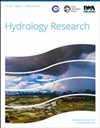Quantifying the contribution of uncertainty sources of artificial neural network models using ANOVA for reservoir power generation
IF 2.4
4区 环境科学与生态学
Q2 Environmental Science
引用次数: 1
Abstract
There are many sources of uncertainty in reservoir operation. The presence of these uncertainties might lead to operation risks, which directly affect the comprehensive benefit of reservoirs. This study developed a simple framework to quantify the uncertainty contribution arising from the inputs, model structures, model parameters, and their interaction in the reservoirs. We established a deterministic reservoir operations model with the intention of maximizing power generation, and the scheduling results with the inputs and optimal output datasets were used for data-driven models – artificial neural networks (ANNs). The time period, inflow, storage, and inflow in the last period were chosen as input, integrating with ANN models of different structures and parameters, to produce an ensemble of 10-day forecasts of power generation. The analysis of variance (ANOVA) method was applied to quantify the contribution of the uncertainty sources. The results demonstrated that the inputs were the predominating source of uncertainty in the reservoir operation, especially from May to October. In addition, the uncertainty caused by the interactions between the three sources of uncertainty was more considerable than that of the model structure or parameter in November–April, and the uncertainty contributions of the model structure or parameter were relatively marginal.利用方差分析量化水库发电人工神经网络模型不确定性来源的贡献
在油藏生产中存在许多不确定因素。这些不确定性的存在可能会导致运行风险,直接影响到水库的综合效益。本研究开发了一个简单的框架来量化由输入、模型结构、模型参数及其在储层中的相互作用引起的不确定性贡献。建立了以发电量最大化为目标的确定性水库调度模型,并将输入和最优输出数据集的调度结果用于数据驱动模型-人工神经网络(ann)。选取时间段、入库量、库存量和上一时段入库量作为输入,结合不同结构和参数的人工神经网络模型,生成10天发电量预测集合。采用方差分析(ANOVA)方法量化不确定性源的贡献。结果表明,在5 ~ 10月期间,输入量是水库运行不确定性的主要来源。另外,在11 - 4月,三种不确定性源相互作用导致的不确定性比模型结构或参数的不确定性贡献更大,模型结构或参数的不确定性贡献相对较小。
本文章由计算机程序翻译,如有差异,请以英文原文为准。
求助全文
约1分钟内获得全文
求助全文
来源期刊

Hydrology Research
Environmental Science-Water Science and Technology
CiteScore
5.30
自引率
7.40%
发文量
70
审稿时长
17 weeks
期刊介绍:
Hydrology Research provides international coverage on all aspects of hydrology in its widest sense, and welcomes the submission of papers from across the subject. While emphasis is placed on studies of the hydrological cycle, the Journal also covers the physics and chemistry of water. Hydrology Research is intended to be a link between basic hydrological research and the practical application of scientific results within the broad field of water management.
 求助内容:
求助内容: 应助结果提醒方式:
应助结果提醒方式:


